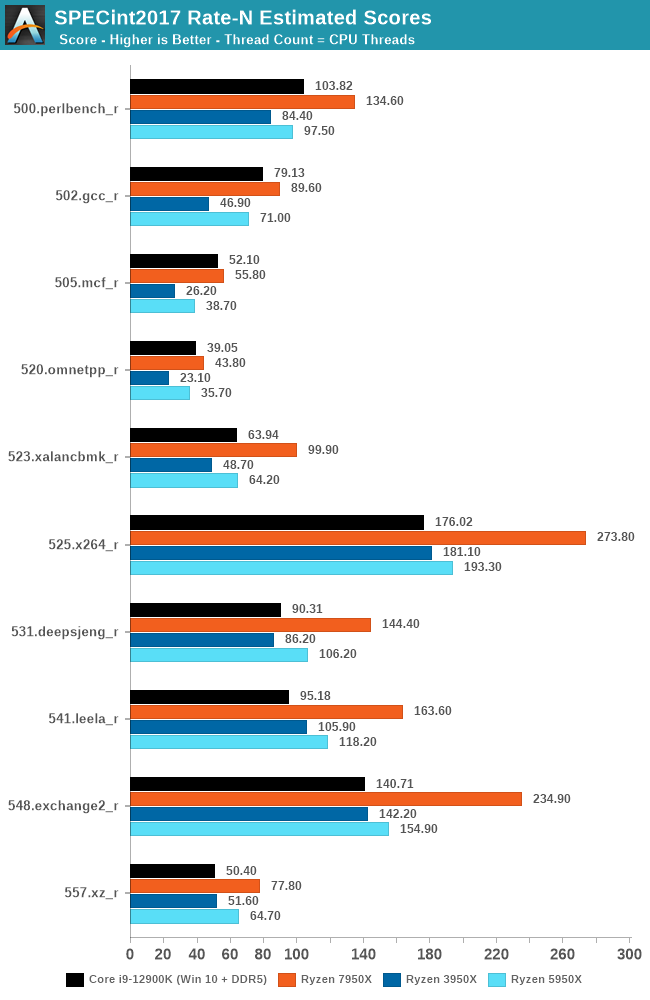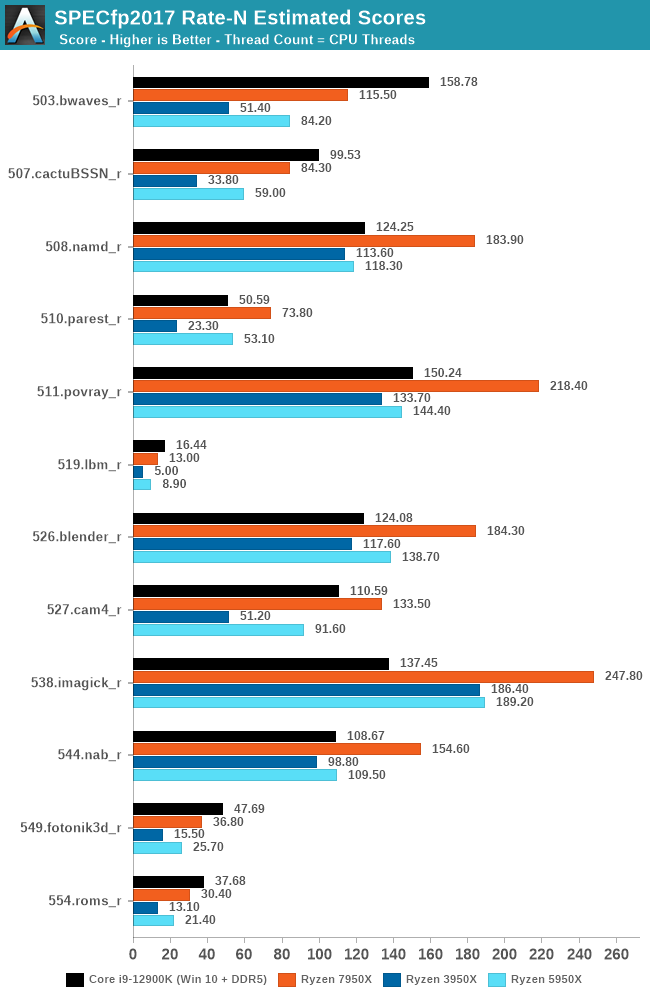AMD Zen 4 Ryzen 9 7950X and Ryzen 5 7600X Review: Retaking The High-End
by Ryan Smith & Gavin Bonshor on September 26, 2022 9:00 AM ESTSPEC2017 Multi-Threaded Results
Although single-threaded performance is important and Zen 4 has a clear advantage here, multi-threaded performance is also very important. Some variables to consider when evaluating multi-threaded performance is that desktop processor designs typically boost a single core higher, with the rest lagging in frequency behind to either stay under the thermal (TJMax) or power (TDP) envelopes. Some manufacturing processes are more efficient by design due to extensive R+D and product management, with Zen 4 looking to be much more in terms of perf per watt over Intel's Alder Lake architecture.
In the instance of the AMD Ryzen 9 7950X, it has a clear advantage over its predecessors in that it not only has a higher single core boost (5.7 GHz versus 4.9 GHz), but it also has a higher TDP than the Ryzen 9 5950X (170 W versus 105 W. This increase in TDP not only allows for a higher frequency, but it allows for a higher frequency spread across all of the cores when under full load.

Opening up our look at our SPECint2017 NT results, and we see a similar uplift in performance gains as we did in the single-threaded tests. In tests such as 500.perlbench_r, the Ryzen 9 7950 is 38% ahead of AMD's previous generation Ryzen 9 5950X, which is impressive. In 523_.xalanbmk_r, the Ryzen 9 7950 is 55% ahead of the Ryzen 9 5950X, and over 100% better in performance over the Zen 2-based Ryzen 9 3950X.

In our SPECfp2017 NT testing, certain workloads such as in 538.imagick_r showed massive increases in performance over previous generations, with a 30% uplift in performance over Zen 3. The difference here between Zen 3 and Zen 2 was marginal (10%), but Zen 4 is a more efficient core architectural design, with many improvements across the board playing a hand here; the switch to DDR5 versus DDR4, more cache per core, higher frequency, higher TDP, etc.
Overall AMD's Zen 4 architectural differences and improvements show that not only does AMD have the crown for single-threaded performance, but it's also ahead in multi-threaded performance too, at least from our SPEC2017 testing. As always when Intel or AMD makes a claim on IPC performance increases, AMD seems to be about right with claims of around 29% in ST performance and even more so in MT performance.










205 Comments
View All Comments
tuxRoller - Monday, September 26, 2022 - link
When does an explanation become an excuse? ReplyUltraTech79 - Friday, September 30, 2022 - link
Well rehire them or youre going to see a real quality loss. Is it really worth it in the longrun? ReplyRyan Smith - Friday, September 30, 2022 - link
"Is it really worth it in the longrun?"That's a question for the people that pay the bills. It's not my call. Reply
Iketh - Saturday, October 1, 2022 - link
I will professionally edit for next to nothing just because I love this site. Email me iketh28@yahoo.com ReplyScottSoapbox - Tuesday, October 4, 2022 - link
Grammarly is a cheap replacement that will catch the worst of it. ReplySivar - Monday, September 26, 2022 - link
I agree that the paragraph was in need of some work, but "thinkos" happen, esp. with an article of this depth. I like that you reported it, but I wonder if it could have been worded differently. Imagine spending days aggressively writing a detailed analysis, only to have one's writing compared to a stroke victim because of a tiny percent of the article. ReplyJasonovich - Sunday, October 9, 2022 - link
Grammar fascism is distracting from the main body of the article. It's like the cream from your glass of Guinness pouring on to your fingers, no big deal just lick it off. The integrity of the article is intact and I'm sure the message was received loud and clear from Anandtech's spoof readers.Anyway many thanks for the excellent article, other sites don't try half as hard as the folks from Anandtech. Reply
philehidiot - Wednesday, September 28, 2022 - link
This sentence seems perfectly cromulent. I think the point purvulates nicely and is quite unfornitabulated. Replygryer7421 - Monday, September 26, 2022 - link
Hi, thanks for the article. In the future .. please start posting HIGHEST all-die TEMPS hit during each benchmark..It would be help to know and see the temps for building workstations given that INTEL and AMD both just uncorked the genie by not caring about temps anymore and only caring about ''top cou speed'' at ant (thermal) cost. Reply
Gavin Bonshor - Monday, September 26, 2022 - link
With Zen 4, the highest all-die temp is essentially 95°C, due to the way Precision Boost Overdrive works. The idea is that it will use all over the available power/thermal headroom, so those with better CPU cooling, should technically benefit more. Reply